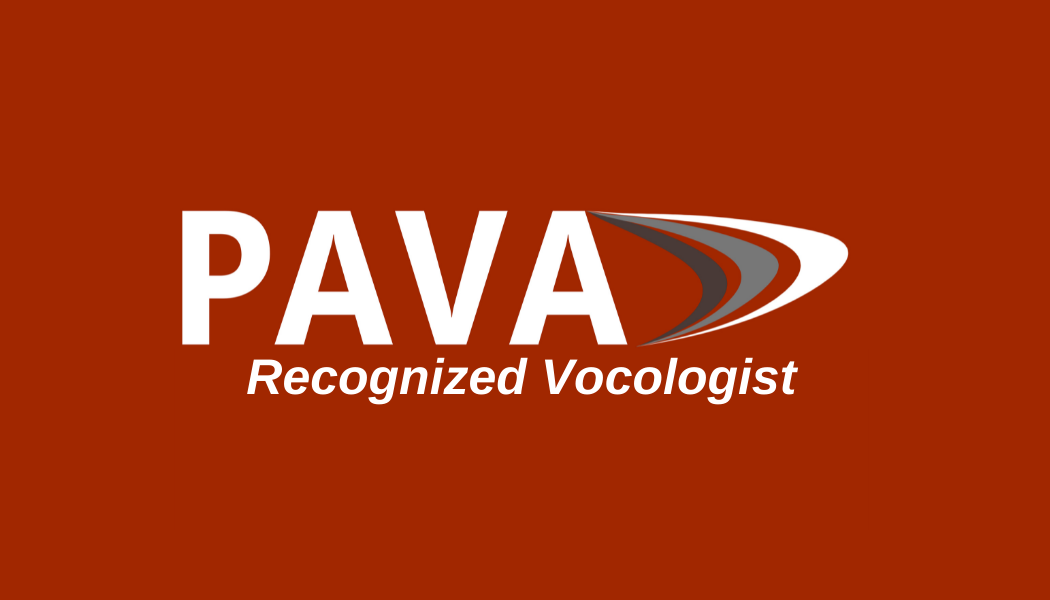Frequently-Asked Questions PAVA Recognized Vocologist (PAVA-RV) Designation (REVISED June 8, 2022) PAVA is a multidisciplinary, member-driven organization comprised of voice professionals from numerous voice-related disciplines including Acting and Speaking Voice Habilitation, Choral Conducting, Laryngology, Manual Therapy and Bodywork, Music Education, Performance, Singing Voice Habilitation, Speech-Language Pathology, Vocal Coaching and Music Directing, Voice Science, and Vocology Research. PAVA serves to bridge these disciplines toward the common goal of understanding all aspects of vocalization. Below are some frequently asked questions to help members better understand the development of the PAVA Recognized Vocologist (PAVA-RV) designation.
1. Why is PAVA developing a recognition for Vocologists? The purpose of the PAVA Recognition is to acknowledge professional engagement, experience, and knowledge across all vocology disciplines.
2. What is the process for becoming a PAVA-RV? The PAVA-RV process will include a hybrid application that assesses:
All applicants, regardless of background/education/experience, will be required to follow the same process to ensure consistency and integrity of the recognition process.
3. Can anyone become a PAVA-Recognized Vocologist? Much thought and effort has been put into accommodating the numerous, interdisciplinary backgrounds that comprise PAVA membership. In alignment with these efforts, the process of obtaining recognition will be interdisciplinary and open to Full Members of PAVA in good standing.
4. Will PAVA-RV certify me to do therapy/teach singing/be a researcher/etc.? PAVA-RV recognizes your established professional credentials, as well as your multidisciplinary understanding of and your experience in vocology. Obtaining PAVA Recognition indicates that one has demonstrated knowledge and experiences across vocology disciplines but does not constitute an evaluation or endorsement of the application of this knowledge. It will not train or certify you in voice habilitation, rehabilitation, or any other vocology discipline. Obtaining PAVA recognition should not be considered in any way a form of license or credential to practice within any field of vocology. It is the organization’s recognition of knowledge, training, and experience. It is an honorific distinction, not a certification of any kind.
5. Is PAVA trying to regulate who can teach voice or provide voice therapy? The intent of PAVA recognition is not to govern or regulate any discipline; rather, our hope is that it will add credibility to our members’ established professional credentials (especially in fields not formally regulated) and encourage multidisciplinary study of all vocology disciplines that can inform members’ established profession. PAVA strives to recognize educational knowledge and experiences in vocology, but does not attempt to regulate anyone's practice.
6. How has PAVA developed the PAVA-RV process? Many PAVA members have been involved in creating the PAVA-RV recognition (see full list below) over several years. PAVA first established the Credentialing/Specialization committee in January, 2016. It was charged with establishing standards for a general knowledge-base that is germane to all vocology disciplines and to create a method to assess this body of knowledge. Comprised of PAVA members who represent an array of vocology areas, the Credentialing/Specialization committee formed the Standards Selection subcommittee and the Feasibility subcommittee. Each of those committees completed their charge in May of 2020. The PAVA Implementation Committee was then formed to complete the process.
7. What did the Standards Selection subcommittee accomplish? The Standards Selection Subcommittee was comprised of professionals from an array of vocology specializations. The committee’s charge was to develop recommendations regarding the content that should be included in an assessment tool, which will be used, in part, to determine an applicant’s candidacy to receive the designation of PAVA-RV. The information was agreed upon by subcommittee consensus to be accurate, germane, and to cover a wide variety of subtopics within vocology. 8. What did the Feasibility subcommittee accomplish?The Feasibility Subcommittee analyzed the issues surrounding PAVA Recognition and made recommendations to the Credentialing/Specialization committee pertaining to the financial, legal, and practical feasibility of implementing an assessment tool for the PAVA-RV designation. The subcommittee recommended that applicants be assessed through a hybrid tool that included a test and a portfolio that would demonstrate applicants’ professional credentials. The subcommittee developed the portfolio requirements in consultation with focus groups of PAVA members. The portfolio framework requires applicants to submit supporting documentation that demonstrates (a) they are currently established in a profession related to vocology, and (b) they have obtained multidisciplinary experiences across a range of vocology disciplines and areas. The PAVA Board of Directors approved the Feasibility subcommittee’s portfolio framework in May, 2020. 9. What is the status of the rolling out of PAVA-RV?The Implementation committee was charged with developing a plan to implement the hybrid testing and portfolio model as outlined by the Credentialing/Specialization committee. As of early 2022, the Implementation Committee had completed the following tasks:
The committee continues to meet with the Ethics and Legal Committees to ensure the viability of this initiative. Once that process is complete, we will set a date to present the PAVA-RV application to the entire membership. 10. What is PAVA doing to make this initiative available for people whose primary language is not English? Below are the names of the PAVA members who, according to official committee reports, worked on developing the PAVA-RV process over the years. We recognize many others may have contributed in ad hoc ways that may not have been reflected in the official records of our young organization. If you contributed and are not listed, please contact pava-rv@pavavocology.org so that we may recognize you. Peggy Baroody Ken Bozeman Troy Castle Starr Cookman Joseph Michael Falduti Rachelle Fleming Amanda Flynn Julia Gerhart Marina Gilman Felix Graham Lynn Helding Allen Henderson Anna Hersey Rachel Hirshorn-Johnston Ian Howell Eric Hunter Liz Johnson Aaron Johnson Art Joslin John Nix Katherine Osborne Brittney Redler Ed Reisert Amelia Rollings Bigler Marci Rosenberg Mary Sandage Leda Scearce Loraine Sims Brad Story Ingo Titze |
